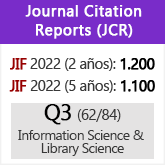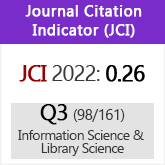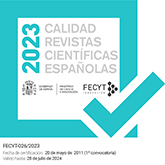Modelos evaluativos de Metaliteracy y alfabetización en información como factores de excelencia académica
DOI:
https://doi.org/10.3989/redc.2017.3.1410Palabras clave:
Metaliteracy, conocimiento de la información, alfabetización académica, modelo de indicadores, evaluación de competenciasResumen
El trabajo analiza la transformación de la alfabetización en información a partir de la confluencia de las competencias en información con las competencias en comunicación. Esta confluencia se hace necesaria por el nuevo contexto que en Educación impone la eScience, la Web Social, el aprendizaje colaborativo y la imagen para la formación académica. La alfabetización en información debe coordinarse con la visual literacy, la dataliteracy, la transliteracy, la new media literacy, lo que hace posible el impacto de la metaliteracy en Educación. El trabajo estudia la definición de la metaliteracy en Educación Superior para demostrar la necesidad del diseño de un modelo de evaluación para unas competencias en metaliteracy, por lo que detalla el método de búsqueda de referentes y llegar a la presentación de una estructura de categorías que organicen la propuesta de indicadores apropiados, presentando la propuesta de un modelo de evaluación de competencias para metaliteracy.
Descargas
Citas
Adams, C.; Buetow, S.; Edlin, R.; Zdravkovic, N.; Heyligers, J. (2016). A collaborative approach to integrating Information and Academic Literacy into the Curricula of Research Methods Courses. The Journal of Academic Librarianship, vol. 42 (3), 222-231 https://doi.org/10.1016/j.acalib.2016.02.010
ALA/ACRL (2011). Visual literacy competency standards for higher education. http://www.ala.org/acrl/ standards/visualliteracy [23/01/2017]
ALA/ACRL (2016). Information Literacy Competency Standards for Higher Education. http://www.ala.org/acrl/ standards/informationliteracycompetency [24/01/2017]
Alper, M. (2013). Developmentally appropriate new media literacies: Supporting cultural competencies and social skills in early childhood education. Journal of Early Childhood Literacy, vol. 13 (2), 175-196. https://doi.org/10.1177/1468798411430101
Berman, E. (2013). Transforming Information Literacy in the Sciences through the lens of e-Science. Communications in Information Literacy, vol. 7 (2), 161-170.
Bobish, G. (2011). Participation and pedagogy: Connecting the social web to ACRL learning outcomes. The Journal of Academic Librarianship, vol. 37 (1), 54-63 https://doi.org/10.1016/j.acalib.2010.10.007
Borges, J. (2014). Competências infocomunicacionais na atuação política de organizações da sociedade civil. Tendências da Pesquisa em Ciência da Informação, vol. 7 (2), 81-102
Brandão, G.; Borges, J. (2014). Emprego das competências em informação pelos estudantes de arquivologia da universidade federal da bahia. Ágora, vol. 24 (49), 277-310.
Brandtweiner, R.; Donat, E.; Kerschbaum, J. (2010). How to become a sophisticated user: a two-dimensional approach to e-literacy. New Media & Society, vol. 12 (5), 813-833 https://doi.org/10.1177/1461444809349577
Bridges, L.M. (2012). Librarian as professor of Social media Literacy. Journal of Library Innovation, vol. 3 (1), 48-65
Brown, T.H. (2006). Beyond constructivism: Navigationism in the knowledge era. On the Horizon, vol. 14 (3), 108- 120 https://doi.org/10.1108/10748120610690681
Buckingham, D. (2003) Media Education: Literacy, Learning and Contemporary Culture. Polity Press: Cambridge Buckingham, D. (2008). Defining digital literacy-what do young people need to know about digital media? En C. Lankshear; M. Knobel (editores), Digital literacies (pp. 73-90). New York: Peter Lang.
Bundy, A. (ed.) (2004). Australian and New Zealand Information Literacy Framework principles, standards and practice. ANZIIL: Adelaide
Calzada, F.J.; Marzal, M.A. (2013). Incorporating Data Literacy into Information Literacy Programas: Core Competencies and Contents. Libri, vol. 63 (2), 123– 134 https://doi.org/10.1515/libri-2013-0010
Catts, Y; Lau, J. (2008). Towards Information Literacy Indicators. UNESCO: París
Chang, C.S.; Liu, E.Z.F.; Lee, C.Y.; Chen, N.S.; Hu, D.C.; Lin, C.H. (2011). Developing and validating a media literacy self-evaluation scale (MLSS) for elementary school students. The Turkish Online Journal of Educational Technology, vol. 10 (2), 63-71
Chen, D-T.; Wu, J.; Wang, Y-M. (2011). Unpacking media literacy. Journal on Systemics, Cybernetics and Informatics, vol. 9 (2), 84-88
Comisión Europea (2003). SIBIS: Statistical Indicators Benchmarking Information Society. Indicator Handbook. http://www.sibis-eu.org/files/Sibis_ Indicator_Handbook.pdf [24/01/2017]
Comisión Europea. Measuring Digital Skills across the EU: EU wide Indicators of Digital Competence. https://ec.europa.eu/digital-single-market/en/news/ measuring-digital-skills-across-eu-eu-wide-indicators-digital-competence [24/01/2017]
Denda, K. (2015). Developing Interview Skills and Visual Literacy: A New Model of Engagement for Academic Libraries. Portal: Libraries and the Academy, 15(2), 299-314 https://doi.org/10.1353/pla.2015.0024
Dunaway, M.K. (2011). Connectivism. Learning theory and pedagogical practice for networked information landscapes. Reference Services Review, vol. 39 (4), 675- 685 https://doi.org/10.1108/00907321111186686
Ferrari, A. (2013). DIGCOMP: A Framework for Developing and Understanding Digital Competence in Europe. European Commission Joint Research Centre. Institute for Prospective Technological Studies [eds. Y. Punie; B. Brecko]: Luxemburgo
Ferrés, J.; Piscitelli, A. (2012). La competencia mediática : propuesta articulada de dimensiones e indicadores. Comunicar, v. 19 (38), 75-82 https://doi.org/10.3916/C38-2012-02-08
Gee, J.P. (2007). Good Video Games and Good Learning: Collected Essays on Video games Learning and Literacy. Peter Lang; New York https://doi.org/10.3726/978-1-4539-1162-4
Giones-Valls, A.; Serrat-Brustenga, M. (2010). La gestión de la identidad digital: una nueva habilidad informacional y digital. BiD: textos universitaris de biblioteconomia i documentació, 24. http://bid. ub.edu/24/giones2.htm [24/01/2017].
Godwin, P. (2009). Information Literacy and Web 2.0: is it just hype? Program: electronic library and information systems, vol. 43 (3), 264-274 https://doi.org/10.1108/00330330910978563
González Fernández-Villavicencio, N. (2012). Alfabetización para una cultura social, digital, mediática y en red. Revista Española de Documentación Científica, 35 (Monográfico), 17-45. https://doi.org/10.3989/redc.2012.mono.976
Gunn, C.; Hearne, S.; Sibthorpe, J. (2011). Right from the start: A rationale for embedding academic literacy skills in university courses. Journal of University Teaching & Learning Practice, vol. 8 (1), 1-6
Hargittai, E. (2005). Survey measures of web-oriented digital literacy. Social Science Computer Review, vol. 23 (3), 371-379 https://doi.org/10.1177/0894439305275911
Harris, B. R. (2013). The New ACRL Information Literacy Competency Standards. Revising reception. Communications in Information Literacy, vol.7 (2), 139-145.
Hattwig, D.; Bussert, K.; Medaille, A.; Burgess, J. (2013). Visual literacy standards in higher education: new opportunities for libraries and student learning. Portal: Libraries and the Academy, vol. 13 (1), 61-89 https://doi.org/10.1353/pla.2013.0008
Henderson-Sellers, B.; González-Pérez, C. (2005). A comparison of four process metamodels and the creation of a new generic standard. Information and Software Technology, vol. 47 (1), 49-65 https://doi.org/10.1016/j.infsof.2004.06.001
Holden, I. (2012). Predictors of Students' Attitudes toward Science Literacy. Communications in Information Literacy, vol. 6 (1), 107-123
Instituto Nacional de Tecnologías Educativas y Formación del Profesorado (INTEF) (2013). Marco Común de la Competencia Digital Docente v. 2.0. Plan de Cultura Digital en la escuela: Ministerio de Educación, Cultura y Deporte: Sevilla.
Jacobson, T. E.; Mackey, T. P. (2013). Proposing a metaliteracy model to redefine information literacy. Communications in Information Literacy, vol.7 (2), 84-91.
Jenkins, H. et al. (2009). Confronting the Challenges of Participatory Culture. Media Education for the 21st Century. MIT Press; Cambridge (Mas.)-London
Kutner, L.; Armstrong, A. (2012). Rethinking Information Literacy in Globalized World. Communications in Information Literacy, vol. 6 (1), 24-33.
Lau, J. (2008). Directrices sobre desarrollo de habilidades informativas para el aprendizaje permanente. IFLA. https://www.ifla.org/files/assets/information-literacy/ publications/ifla-guidelines-es.pdf https://doi.org/10.1515/9783598440946
Lee, L.; Chen, D.; Li, J.; Lin, T. (2015). Understanding new media literacy: The development of a measuring instrument. Computers & Education, vol. 85, 84-93. https://doi.org/10.1016/j.compedu.2015.02.006
Lemos, A. (2009). Cibercultura como território recombinante. A Cibercultura e Seu Espelho: Campo De Conhecimento Emergente e Nova Vivência Humana Na Era Da Imersão Interativa. São Paulo: ABCiber, 38-46.
Lin, T.; Li, J.; Deng, F.; Lee, L. (2013). Understanding new media literacy: An explorative theoretical framework. Journal of Educational Technology & Society, vol. 16 (4), 160-170.
Machin-Mastromatteo, J.D. (2012). Participatory action research in the age of social media: literacies, affinity spaces and learning. New Library World, vol. 113 (11-12), 571-585. https://doi.org/10.1108/03074801211282939
Mackey, T. P.; Jacobson, T. E. (2011). Reframing information literacy as a metaliteracy. College & Research Libraries, vol. 72 (1), 62-78. http://crl.acrl. org/index.php/crl/article/view/16132/17578 https://doi.org/10.5860/crl-76r1
Mackey, T. P.; Jacobson, T. E. (2014). Metaliteracy: Reinventing information literacy to empower learners. Facet; London
MacMillan, M.; MacKenzie, A. (2012). Strategies for integrating Information Literacy and Academic Literacy. Helping undergraduate students make the most of scholarly articles. Library Management, vol. 33 (8-9), 525- 535. https://doi.org/10.1108/01435121211279885
Marzal, M.A.(2010). La evaluación de los programas de alfabetización en información en educación superior: estrategias e instrumentos. Revista de Universidad y Sociedad del Conocimiento (RUSC), vol. 7 (2), 28-38
McBride, M.F. (2012). Reconsidering Information Literacy in the 21st Century: the redesign of an Information Literacy Class. Journal of Educational Technology Systems, vol.40 (3), 287-300. https://doi.org/10.2190/ET.40.3.e
Moeller, S.; Joseph, A.; Lau, J.; Carbo, T. (2011). Towards Media and Information Literacy Indicators. Background Document of the Expert Meeting, 4-6 November 2010, Bangkok (Thailand). UNESCO; Paris
Moselen, C.; Wang, L. (2014). Integrating Information Literacy into Academic Curricula: A professional development programme for librarians at the University of Auckland. The Journal of Academic Librarianship, vol. 40 (3), 116- 123. https://doi.org/10.1016/j.acalib.2014.02.002
Pidd, M. (2009), Tools for Thinking: Modelling in Management Science. Wiley; Chichester
Ponjuán, G.; Pinto, M.; Uribe Tirado, A. (2015). Conceptualización y perspectivas de la alfabetización informacional en iberoamérica: Un estudio delphi. Information Research, vol. 20 (3), 1-26.
Radcliff, S; Wong, E. (2015). Evaluation of sources: a new sustainable approach, Reference Services Review, vol. 43 (2), 231 – 250. https://doi.org/10.1108/RSR-09-2014-0041
Rheingold, H. (2010). Tools for Thought: The History and Future of Mind-Expanding Technology, The Virtual Community: Homesteading on the Electronic Frontier. MIT Press
Shenton, A.K.; Hay-Gibson, N.V. (2012). Information behaviour meta-models. Library Review, vol. 61 (2), 92- 109. https://doi.org/10.1108/00242531211220735
Siemens, G. (2010). Conociendo el conocimiento. Traducido por Nodos Ele: Quintana, E.; Vidal, D.; Torres, L.; Castrillejo, V.; Santamaria, F.; Alonso, N. http://yoprofesor. org/2015/12/06/conociendo-el-conocimiento-george-siemens-descarga-gratuita/ [24/01/2017]
Szigeti, K.; Wheeler, K. (2011). Essential Readings in E-Science. Issues in Science and Technology Librarianship, (64).
Thomas, A. B.; Hodges, A. R. (2015). Build sustainable collaboration: Developing and assessing metaliteracy across information ecosystems. Paper presented at the ACRL 2015, Portland, Oregon. 78-94.
Tyner, K. (2008). Audiencias, intertextualidad y nueva alfabetización en medios. Comunicar: Revista Científica de Comunicación y Educación, vol. 15 (30), 79-85. https://doi.org/10.3916/c30-2008-01-012
UNESCO (2009). Guide to measuring Information and Communication Technologies, ICT, in Education. Institute for Statistics: Quebec
UNESCO (2011). Towards Media and Information Literacy Indicators. UNESCO: París
UNESCO; Athabasca University (2015). e-Media and Information Literacy Course. http://www.unesco. org/new/en/communication-and-information/ crosscutting-priorities/gender-and-media/women-make-the-news-2016/register-for-online-mil-course/ [24/01/2017]
Witek, D.; Grettano, T. (2014). Teaching metaliteracy: A new paradigm in action. Reference Services Review, vol. 42 (2), 188-208. https://doi.org/10.1108/RSR-07-2013-0035
Publicado
Cómo citar
Número
Sección
Licencia
Derechos de autor 2017 Consejo Superior de Investigaciones Científicas (CSIC)

Esta obra está bajo una licencia internacional Creative Commons Atribución 4.0.
© CSIC. Los originales publicados en las ediciones impresa y electrónica de esta Revista son propiedad del Consejo Superior de Investigaciones Científicas, siendo necesario citar la procedencia en cualquier reproducción parcial o total.Salvo indicación contraria, todos los contenidos de la edición electrónica se distribuyen bajo una licencia de uso y distribución “Creative Commons Reconocimiento 4.0 Internacional ” (CC BY 4.0). Puede consultar desde aquí la versión informativa y el texto legal de la licencia. Esta circunstancia ha de hacerse constar expresamente de esta forma cuando sea necesario.
No se autoriza el depósito en repositorios, páginas web personales o similares de cualquier otra versión distinta a la publicada por el editor.

















